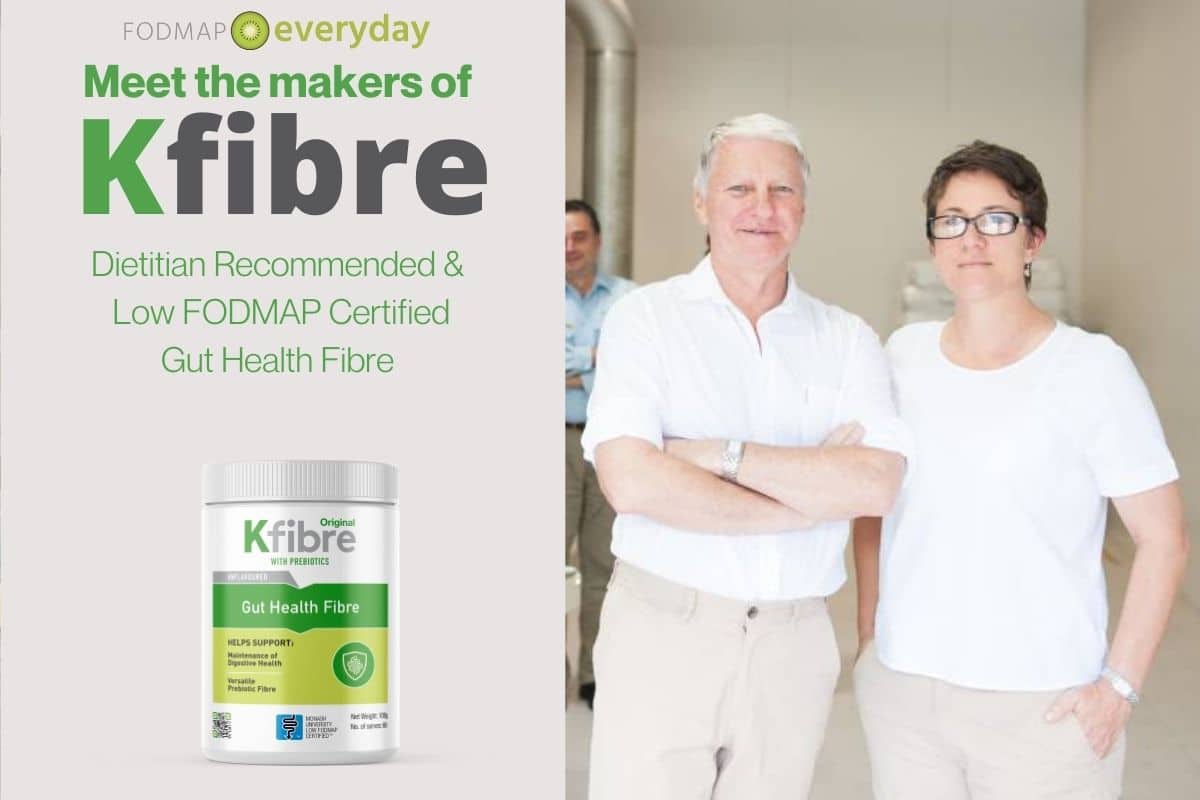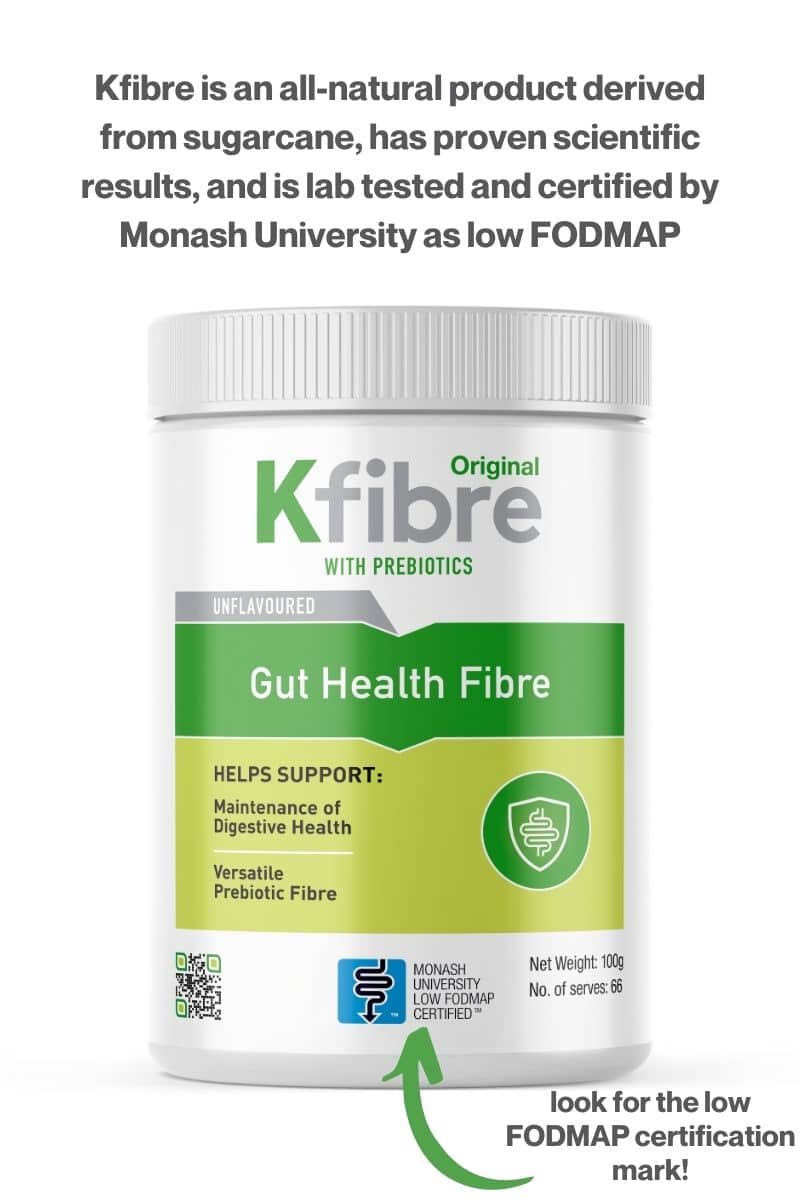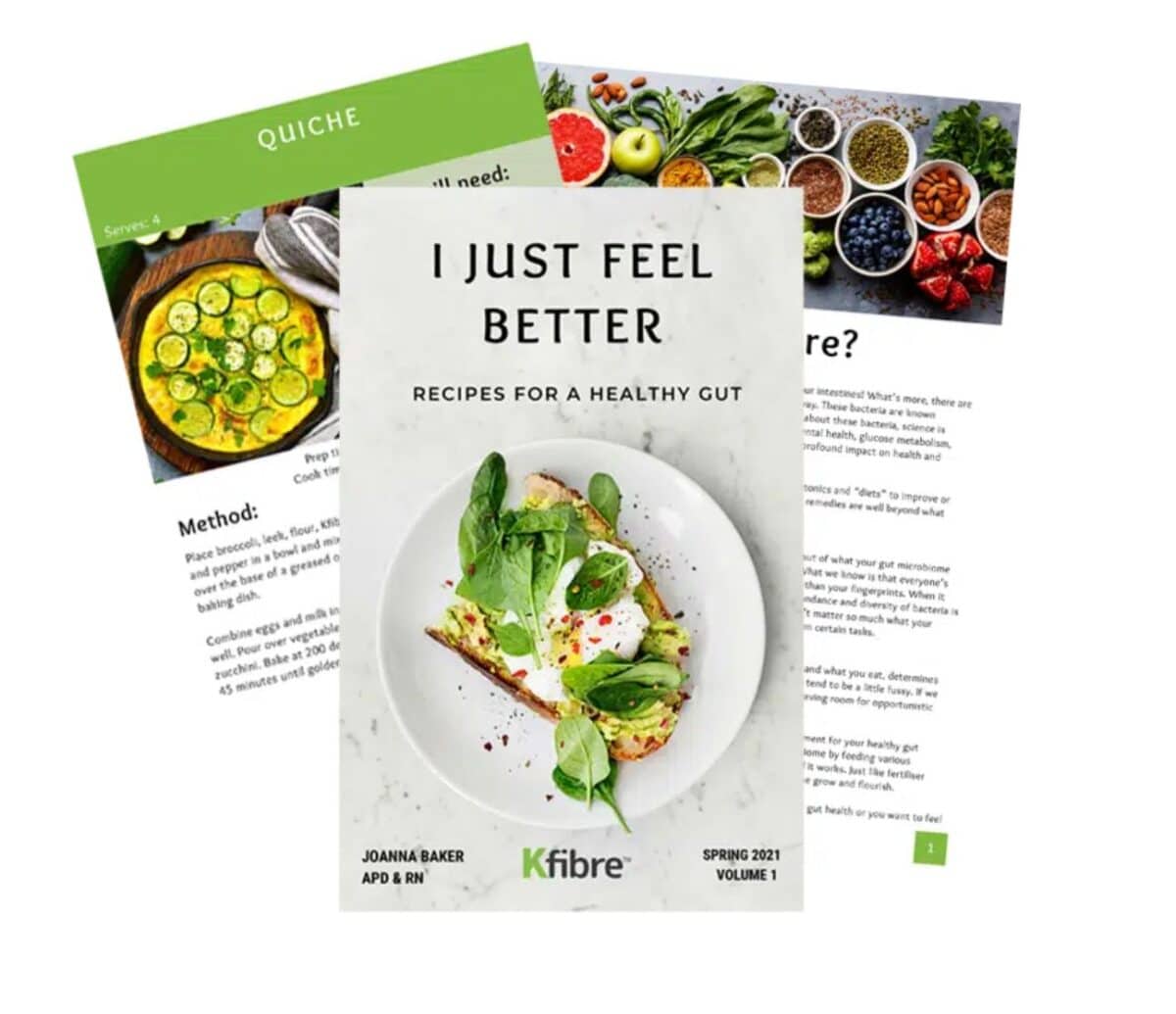Kfibre – A Low FODMAP Certified Fiber
Kfibre is a food-based certified low FODMAP fiber that can be added to your diet to increase fiber intake.

(Note to our readers: The term “fiber” is going to be spelled two ways throughout this article- as we are respecting both the Australian “fibre” and the American“fiber” spellings depending on how who is speaking.)
Fiber is essential for a healthy gut microbiome and during the Elimination Phase of the low FODMAP diet, in particular, a lack of fiber can be an issue. One of the reasons why it is highly recommended that you work with a registered dietitian while undertaking to low FODMAP diet is to make sure that you do not experience any nutritional deficiencies.
Kfibre is Dietitian Recommended
Kfibre is dietitian recommended and a unique and remarkable product that we want to introduce you to; it might very well be a supplement that would be beneficial to add to your regime. Let’s meet the Australian husband and wife team, Janine and Gordon Edwards, who created this product, and low FODMAP experienced dietitian Joanna Baker, who has found great success using Kfibre with her patients.

Dédé Wilson: Janine, Gordon & Joanna thank you for speaking with us and I’m very excited to dive into discussing your company, Health Food Symmetry (HFS), and Kfibre in particular. To paint a picture for our readers, Kfibre is an all-natural product derived from sugarcane, has proven scientific results, and is lab tested and certified by Monash University as low FODMAP. But let’s start at the beginning, tell us about HFS. How did you decide to start HFS, and then specifically how did Kfibre as a product come about?
Janine: Thanks Dédé, we’re excited to talk about Health Food Symmetry (HFS) and Kfibre, or what we call the ultimate prebiotic for gut health management.
The origin story is a simple one played out over several years of development. While working on other food projects we were presented with some Japanese research that proposed sugarcane as a new source of dietary fibre and early trials demonstrated it could restore gut health via several mechanisms.
Gordon: I came from an area where sugarcane was common and we saw the difficulties for some in the sugar industry, so I thought this could be a fantastic diversification and a sustainable approach to use the entire sugarcane plant and create a new gut health product.
The rest of the story is research, development, product trials, clinical trials, regulatory stamps – it’s not easy or cheap to create a new dietary ingredient that will be accepted, however we accomplished this with Kfibre.
I think our community will be fascinated by the fact that Kfibre is based on sugarcane. Can you tell us a little more about that? How is Kfibre extracted from sugarcane?
Gordon: Definitely. Historically sugarcane has been recorded as having medicinal benefits by many cultures. I like to say harnessing those benefits has been both simple and hard. The idea is simple – cut up whole sugarcane, use water to dilute and remove most of the sugar, then dry and mill it.
Now the hard part: sugarcane is one of the most robust & complex fibre structures of any plant, one of the reasons it’s so good for our digestion.
The biggest trick is how do you break down the fibre to a powder that can be digested by the human gut, while also protecting and retaining the cell wall, so that nutrients are locked up in the plant cell wall structure until they’re released in the gut by bacterial digestion.
Janine : We “simply” – figured that out.
LOL, yes, “simply”. So to recap, the sugar is the digestible carbohydrate and is removed leaving the fiber? It is the sugar/carbohydrate that is removed that contains the FODMAPs?
Joanna: Sugarcane itself is already low FODMAP and removing the sugars doesn’t change this. However, the we do remove the sugars for a few reasons: Firstly, while sugar itself is not dangerous, we don’t believe that people need more added sugar in their diet. Secondly, removing the sugar reduces the calorie content. The really cool thing though, is that the technology that Kfibre uses to remove the sugars from the sugarcane allows Kfibre to retain that health benefits of the whole plant, this means it does have polyphenols, antioxidants and other molecules in it that are beneficial to health. So we get all the healthy stuff from the plant without the added sugar.
You gotta love technology. That is fantastic. Thank you for that explanation.
You have also stated that Kfibre is “not just a fiber”. Help us understand Kfibre’s benefits. Who would benefit from using Kfibre?
Gordon: Let’s answer your last question first – Kfibre is for everyone seeking a good gut health and wellness, whether your digestion is off track, or you want a maintenance fibre supplement.
Kfibre is different in comparison to most fibers out there, it’s mostly insoluble, yet it’s still fermentable. Its virgin processed and this means that in addition to the complex dietary fibre with excellent prebiotic function it retains inherent nutrients.
Our base ingredient Kfibre has been through years of research that demonstrates its role in the microbiome with broad benefits in regularity, microbiome support, dietary caused indigestion & bloat, and as a great low FODMAP accredited fiber.
Our new Kfibre Pro range has just launched with a Kfibre, prebiotic and probiotic formulation created by our own scientists and Joanna Baker, our favorite gut health & IBS dietitian. These advanced formulations are Monash University certified low FODMAP and designed to make the path to better digestion easier for consumers with products designed for specific areas of digestion. They are convenient ready-to-mix powders that dissolve easily in water and feature great flavors, too.
The orange flavor blend is geared towards helping with constipation; the berry flavor is targeted towards easing indigestion and bloat; our unflavored is for general digestion support. You can even add these powders to yogurt, a smoothie or your favorite baking recipe. Our customer service team or your RD can help determine which Kfibre Pro product is best for you.

So if it is fermentable, it still contains some FODMAPs but in low enough amounts to be low FODMAP?
Joanna: Not exactly; not all fermentable fibres are FODMAPs. FODMAPs are specifically short chain carbohydrates that are “rapidly fermentable”. As Kfibre’s fibre profile is a long chain and it is “uniformly” fermented, so it does not fit the FODMAP criteria. By “fermentable” we mean that it, as a prebiotic, produces SCFA’s to feed the good bacteria in your microbiome.
We know this might get a bit technical for some reading this, but that was a helpful explanation. And also points out why we need our RDs and that it makes sense to use low FODMAP certified products!
I love that you address SCFAs (short chain fatty acids) and butyric acid on the FAQ page on your site. Some of our community members will know what these are, and some will not – but they should, especially as related to the low FODMAP diet! Take us through this please.
Joanna : Short-chain fatty acids or SCFAs are the health elixirs produced right inside our gut by certain bacteria in our large intestine when they feed on prebiotic fibers.
SCFAs are associated with numerous health benefits not only inside the gut but influencing a variety of health functions throughout body. As you mention, butyric acid, for instance is an energy source for colon cells thus required for healthy intestinal barrier function. Moreover, SCFAs control the activities of the immune system, can help us respond better to certain treatments/therapies and also play a role in controlling our appetite and mood.
Those on a low FODMAP diet run the risk of a significant drop in the SCFA production due to lack of sufficient dietary fibre, particularly during the first, more restrictive Elimination Phase. This is an unfortunate, potential negative along the path of learning your FODMAP sensitivities and dealing with IBS like symptoms.
Kfibre, however, is a low FODMAP certified prebiotic that can help you overcome the fibre gap and provide prebiotic benefits like feeding your gut microbiome to help produce SCFAs while on a low FODMAP diet. It’s a great starting point with many of my patients.
There are many fiber supplements out there and psyllium is a source that many are familiar with. How does Kfibre differ from psyllium?
Gordon: The vast majority of all market leading prebiotics are isolated/purified and highly processed soluble-only fibres that are rapidly fermented. These soluble-only fibres tend to reduce the diversity of gut bacterial species, which is understood to be a negative for support of long-term gut health.
Oh, everyone reading this should read that last paragraph, and especially the last sentence, again! You just presented that so clearly.
Psyllium is a gelling soluble-only fibre; it’s a low to moderate fermenter and carries a precaution that it may interfere with medications. Essentially most of the value is quite passive in the body with minimal microbiome interaction.
Kfibre on the other hand has excellent microbiome interaction as a complex prebiotic fiber – predominantly insoluble, yet uniformly fermentable by bacteria of the gut. Our research with Kfibre shows that whole gut uniform fermentation minimises gas/bloat risks compared to common prebiotic supplements, and results in increased diversity of gut bacterial species and ultimately SCFA delivery.
This is important when you consider that most inflammation related issues are in the lower or distal part of the colon, and this is a highly sought-after prebiotic effect that Kfibre delivers.
Prebiotics are an essential part of a healthy microbiome. Can you explain why prebiotics are important and also how not all fibers are prebiotics? And how do I know if I am getting enough prebiotics in my diet?
Gordon: Prebiotics are fibers that our gut bacteria can digest. So, all prebiotics are classified as dietary fibre, which is the indigestible portion of plants. But not all fibres are prebiotics.
Prebiotics ultimately determine the support and health of our microbiome as they are the trigger for SCFA production, and as we mentioned, these impacts more than just digestive health.
The most important factor however for consumers is that a prebiotic or dietary fibre supplement should not only be able to influence physiological benefits and modulate microbial diversity, but should also be tolerable without the risk of undesirable side effects.
And finally, the simple answer is most people aren’t getting enough fibre in their diet, so they aren’t getting enough prebiotics.
And finally, the simple answer is most people aren’t getting enough fibre in their diet, so they aren’t getting enough prebiotics.
Of course, there are those with IBS-C (constipation) and those with IBS-D (diarrhea). Can you explain how Kfibre helps normalize digestion? Can it help both issues?
Gordon: I’ll let Joanna discuss her experience there as it’s quite a detailed area.
Joanna: Great question! This is a bit of a two-fold answer which goes back to the different ways that Kfibre supports. When it comes to dietary constipation the fibre benefits add bulk and softness to the stool, and a soft bulky stool is always more satisfying than a small hard one. In addition, the insoluble fibre portion improves “laxation” so the stool moves through faster and more easily. I’ve been using it in my practice for about two years now mostly for constipation and have had really great results. I’ve even had some people avoid the need for an elimination diet or be able to expand their diet quite dramatically when Kfibre is in the picture.
While I don’t often use Kfibre for diarrhoea dominant IBS, I have seen people get an improvement in this, which I suspect is due to the increase in SCFAs and the improved overall gut health. In this case, where someone has a sensitive gut, I do often recommend starting at approximately half the recommended serve, and then build up to the recommended dosage or as tolerated.

How is Kfibre taken? What does it taste like, and does it have a texture or smell? Can it be incorporated into recipes?
Janine : KfibreOriginal is really easy to add to your existing diet. It is tasteless and odorless as an additive to the meals and drinks you already use every day – smoothies, juice, cereal, anything liquid really.
For more interesting ideas on using Kfibre in recipes you can visit Kfibre website and download Joanna’s Dietitian-prepared recipes in our multiple-volume book series, “I JUST FEEL BETTER”. The free recipe books are designed for quick and easy recipes for the whole family by incorporating Kfibre. The recipes also provide modifications for low FODMAP, dairy-free and gluten-free to suit your dietary requirements.

Gordon : With KfibrePro you have an advanced probiotic blended formulation for gut health; more of a mix and fix strategy for areas of digestive health with nice, flavoured drinks that we aim to be the healthiest addition to a morning routine.
One of the most exciting things for us, in learning about Kfibre, was seeing how well researched the product is, and its efficacy. Some of our readers are laypersons, and others are RDs. Can you highlight some of the most important clinical research in easy-to-understand language, but also provide the scientific paper links?
Gordon: Kfibre has undergone University studies over the last 5 years, and we’ve focused on understanding the effects at the bacterial and SCFA level as well as digestive trials.
We have 2x studies in gut inflammation that confirm the prebiotic function and the natural anti-inflammatory properties of Kfibre through the production of SCFAs and gut microbiome changes. These studies essentially demonstrate the positive impact on the gut barrier, microbiome, in terms of increasing microbial diversity and supporting the good bacteria, and show reductions in gut inflammation due to digestive changes as a result of prebiotic fermentation.
• https://pubmed.ncbi.nlm.nih.gov/30979002/ • https://pubmed.ncbi.nlm.nih.gov/32784883/
We also have a fermentation trial that demonstrated Kfibre is fermented at a more uniform rate compared to a common prebiotic. What this means is that instead of being rapidly digested by bacteria in the gut, and micronutrients only delivered to the upper sections of the gut along with increased gas bloating risks, Kfibre is fermented at a uniform rate that continues along the entire digestive tract effectively until waste passes out.
• https://ifst.onlinelibrary.wiley.com/doi/abs/10.1111/ijfs.14069
HFS has additional study beyond prebiotic function for Kfibre. A clinical pilot trial has been completed to demonstrate the function of Kfibre in dietary indigestion (occasional acid reflux). There are many anecdotal testimonials of reduced dietary indigestion while using Kfibre and this trial has put these reports to the test and confirm via an independent gastrointestinal clinic.
• https://www.ncbi.nlm.nih.gov/pmc/articles/PMC7353237/
We have more research underway in areas of microbiome health outcomes, and digestive studies.
Thank you for laying that out for us. This is fantastic; you have truly accomplished so much, with the evidence-based science to back it all up.
Does HFS have other products?
Gordon: As we mentioned the KfibrePro range has just launched, and it delivers products that have been formulated by our scientific team along with Joanna. They contain secondary active prebiotics and the best probiotic based on our anti-inflammation research.
They allow us to focus the health claim to a simple message – a product formulation for “dietary constipation”, and a product formulation for “dietary indigestion & bloat”. This is just the start; our team has a beautiful pipeline of beneficial products to come, and we think they’ll be game changing in the dietary solutions market. They taste great too!
Tell us about your carbon offset approach. I know this is important for many when researching a company and product.
Gordon: Health Food Symmetry has engaged with its energy supplier to turn all energy delivered to our processing plant into Carbon Neutral.
This is in line with our sustainability policy that all wastewater and its containing nutrients are delivered back to the field as beneficial re-use ensuring all waste is recycled, therefore there is no wasted water, and nutrients for the soil bacteria to thrive on.
We’re trying to promote sustainable health for ourselves and for our plant.
We have worked with Joanna Baker APD AN RN over the years and greatly respect her. Joanna, what are your overall thoughts on Kfibre with a patient focus:
Joanna: I recommend Kfibre to my IBS patients; it is Monash University low FODMAP certified, but more importantly, it works. Improving regularity and gut microbiome has my patients feeling better and improves tolerance, allowing more variety with food – and more variety is always a good thing physically and emotionally. We also know that a low FODMAP diet results in reduced diversity and abundance of microbiota, so I love that Kfibre supports the microbiome during the low FODMAP Elimination Phase. I have a “food first” policy, so meeting needs with real food products rather than supplements fits with this. I also like to be able to recommend something that cares about sustainability and has a process in place.
I thought Joanna’s statement about your product being a food and not a supplement interesting! How do you categorize Kfibre?
Janine: That’s a good question, Kfibre is actually classed as a food with a health relationship in most markets. We chose to launch in this regulatory space of foods as much of the issues that people are experiencing are dietary based problems, and we can offer dietary products instead of just pills. We like to think “food problems, food solutions” if possible – the microbiome is a powerful force, and you must nurture it with prebiotic foods for good health.
Janine, Gordon and Joanna, thank you so much for your time and especially for your dedication to creating a needed fiber product that is food based, easy to use, and clinically supported.
This article was generously sponsored by Health Food Symmetry – Makers of KFibre







